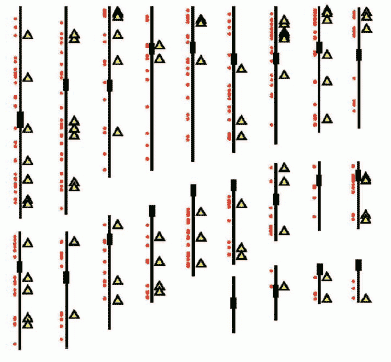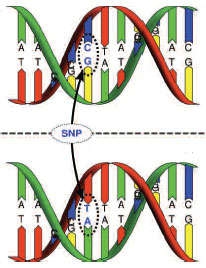After a person's first exposures to a drug, genes exert a major influence on whether he or she will go on to become dependent. Over the past decade, researchers painstakingly identified a handful of genes that appear to contribute to this influence. Recently, however, Dr. George Uhl and colleagues at NIDA's Intramural Research Program (IRP) in Baltimore, Maryland, announced that, using a powerful new technique for identifying genes that are associated with diseases, they have linked at least 89 genes to drug abuse and dependence.
The technique, called genome-wide association studies (GWAS), rapidly examines individuals' entire genomes. Researchers learn which individuals have variant forms of each of our 30,000 or so genes and then correlate these findings with other data—for example, in the present study, the subjects' drug histories. Whereas other techniques for genetic analysis can only handle small study populations of genetically similar people, researchers using GWAS can compare hundreds or thousands of individuals' genomes and establish relationships between gene variants and traits in unrelated and ethnically diverse populations. This extra power has revealed new relationships.
 Location of Genes Associated With Drug Dependence: On this schematic representation of human chromosomes, triangles show the location of the genes linked to abuse of multiple drugs by both European-Americans and African-Americans. Red dots indicate clusters of variations of a single molecular unit in a DNA sequence (SNP) found to differentiate drug abusers from nonabusers.
Location of Genes Associated With Drug Dependence: On this schematic representation of human chromosomes, triangles show the location of the genes linked to abuse of multiple drugs by both European-Americans and African-Americans. Red dots indicate clusters of variations of a single molecular unit in a DNA sequence (SNP) found to differentiate drug abusers from nonabusers.The findings do not indicate that someone who has one or more of the predisposing variants is bound to abuse drugs or develop addiction. Some variants will promote the disorders more and some less strongly; some may make a significant difference only if an individual also has certain others; and some may turn out to be chance associations of genes that actually have no role in drug dependence.
Dr. Uhl, chief of NIDA's Molecular Neurobiology Research Branch, explains, "Unlike cystic fibrosis, which is caused by a single gene, in addiction and a number of complex disorders, many different genes must act together with environmental factors to create the illness. No single gene is likely to have a large effect by itself; it's the combination of effects that produce the vulnerability to the problem."
The study's immediate significance is that it greatly expands the breadth of the genetic input that researchers recognize as potentially influencing drug abuse. Scientists can now turn to investigating how each of the 89 genes might influence the response to drugs. Among the immediate leads, Dr. Uhl's team points out that many of them appear to play roles in memory formation and processing.
The Genes
Dr. Uhl and his colleagues analyzed DNA samples that they collected between 1990 and 2005 from 420 European-American and 560 African-American drug abusers and from 680 ethnically matched nonabusers. Each drug abuser had used a variety of substances and was addicted to at least one illegal substance. The nonabusers had either never used drugs or had only modest exposure; none had ever been addicted. No two study participants belonged to the same family.
The researchers pooled the DNA samples into groups of 20 and applied the pooled DNA samples to microarrays containing millions of DNA probes that bind to specific short sequences of DNA. A powerful computer analysis of the bound DNA revealed single nucleotide polymorphisms (SNPs)—substitutions of a single molecular unit (nucleotide) in a DNA sequence (see box, page 8). Thousands of SNPs occurred more often in the DNA of addicted participants than in that of controls. Some of the SNPs occurred in clusters within 89 genes, where the variations in DNA would be expected to alter the way the gene performs its protein-building function.
Most of the 89 genes were associated with substance dependence among both European-Americans and African-Americans, although some appeared to affect risk in only one ethnic group. The researchers propose that this finding supports the idea that many of the variants that predispose to addiction first occurred relatively early in human evolution, before humankind's diaspora out of Africa led to the formation of separate Asian, African, and European ethnicities.
Many of the genes identified in the study were associated with addiction to several different drugs. This finding accords with those of other GWAS studies conducted by Dr. Uhl and colleagues, which revealed "a remarkable degree of overall convergence" among the SNPs related to European-Americans who were addicted to alcohol, Asians who were addicted to methamphetamine, and smokers with European heritage. The IRP team suggests that genes that predispose to addiction to multiple drugs do so because they affect basic brain features and processes, such as nerve connections and how the brain handles information. Overall, the genes implicated by the current study meet that criterion. Most are active in the brain, where they affect such fundamental characteristics as the ways that nerve cells recognize their neighbors (via cell adhesion molecules); cell structure; enzyme activity; and actions of receptors and other cell membrane components.
Memory Connections
Among the 89 genes that Dr. Uhl and colleagues identified, the team is most intrigued by 21 that regulate cell adhesion processes. Those processes establish the correct wiring of the brain during development, maintain communication between brain cells, and keep the brain adaptable so it can modify old connections and make new ones in adulthood. Almost all of the cell adhesion genes that the study linked to drug abuse are active in brain regions that play roles in memory.
"Cell adhesion molecules control the formation, stabilization, enhancement, and elimination of contacts between brain cells, which are at the core of memory formation," Dr. Uhl says. "Finding this group of gene variants in people who are dependent on addictive substances underscores the important role memory plays in addiction and will help us understand why addicts can relapse decades after their last use of an addictive drug."
Dr. Uhl suggests that addiction involves the implicit, as well as the explicit, memory systems. Explicit memory is immediate and conscious. Implicit memory, in contrast, influences our behavior unconsciously. "Remembering what you need to pick up from the store tonight is a good example of explicit memory," Dr. Uhl says. "But if you are considering those items while you are driving to work and suddenly realize you've gone 10 miles along your route without thinking about it, your implicit memory system is what got you there."
Dr. Uhl speculates that cell adhesion genes may influence the risk of drug abuse and addiction by affecting both memory systems, with special impact on implicit memory systems. When vulnerable people experience the effects of an addictive drug, he suggests, their brains may store that experience deep in the implicit-memory system, where it exerts a stronger-than-usual influence on their behavior.
"Implicit memory may play a more important role than euphoria in the long-term story of a drug addiction," says Dr. Uhl. "Although drug highs produced by the brain's reward system motivate repeated use in the early stages of addiction, many addicts in later stages say they rarely experience dramatic euphoria and complain instead that their drug use is driven by compulsion. They also say they can crave their drug of choice long after they stop using it when they are reminded of it by environmental or social situations. That testimony is consistent with a process in which the brain's pleasure centers help addiction get started, but memory-like features maintain it over time."
Dr. Joni Rutter of NIDA's Division of Basic Neuroscience and Behavioral Research says, "The link between vulnerability to addiction and genes that influence the formation of neural connections and how the brain adapts to experience raises intriguing questions about how drug abuse affects the function of these genes."
Learning From Single Nucleotide Polymorphisms
Simple variations in genetic material are providing profound insights into the roles of specific genes in complex functions, such as behavior. Genes consist of strings of molecular units called nucleotides. Nucleotides come in four varieties, which differ from each other only in the subunits known as bases. Each nucleotide is named after its base: adenine (A), thymine (T), cytosine (C), or guanine (G).
At many locations in the human genome, the nucleotide string that makes up a particular gene is identical in everyone. That is, if you start at one end of the gene and count off the nucleotides in order along one of the two DNA strands, the result is the same—for example, AAGGGATCCAC.... At certain places along the string, however, some people have one nucleotide and others have a different one—for example, AAGGAATCCAC... instead of the more common sequence. Such a variation is called a single nucleotide polymorphism (SNP).
The variations may or may not make a difference in the way a gene functions. However, in either case, scientists can take advantage of the variation to discover associations between genes and critical traits, such as vulnerability to drug addiction.
Beyond Addiction
The IRP team is now applying GWAS in investigations of a variety of brain disorders. "We think the 89 genes we found are the beginning of an alphabet that eventually will allow us to spell out the genetic basis not only of addiction but of a variety of other brain-related disorders as well," Dr. Uhl says. "In our ongoing research, we have found significant overlaps between our addiction genetics datasets and datasets for other brain disorders including Alzheimer's disease and bipolar disorder, leading us to believe that many of these gene variants play roles in a number of brain-related problems."
Dr. Uhl notes that the majority of a person's 30,000 genes are expressed in the brain but that many fewer are likely to affect brain function. "It's logical that there would be overlaps in the genetic underpinnings for various neurologic problems," he says.
"We hope our work will eventually allow clinicians to match at-risk people with the right prevention programs and develop more effective treatment strategies for people who are already using drugs," Dr. Uhl adds. "Just doing that will be reward enough. The wider reach of our research for other brain disorders is icing on the cake."
Sources
Uhl, G.R., et al. "Higher order" addiction molecular genetics: Convergent data from genome-wide association in humans and mice. Biochemical Pharmacology 75(1):98-111, 2008. [Abstract]
Liu, Q.R., et al. Addiction molecular genetics: 639,401 SNP whole genome association identifies many "cell adhesion" genes. American Journal of Medical Genetics Part B (Neuropsychiatric Genetics) 141B(8):918-925, 2006. [Abstract]

